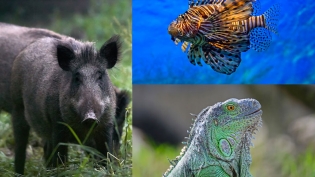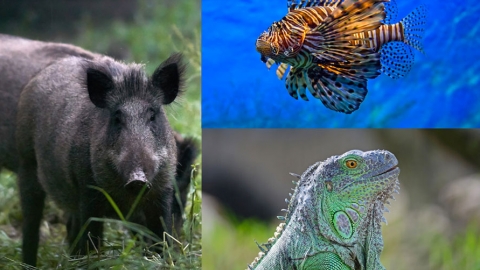New FWC Rules to Protect State from High-Risk Invasive Reptiles
Pythons, iguanas and tegus: good-bye! The Florida Fish and Wildlife Conservation Commission (FWC) has approved rule changes that address importing, breeding and possessing high-risk invasive reptiles. These include Burmese pythons, green iguanas, Argentine black and white tegus, and 13 other non-native snakes and lizards that pose a threat to the state’s ecology, economy and human health and safety.
Addressing invasive species is important for the preservation of native species and the health and safety of our residents and visitors, says Eric Sutton, FWC executive director. South Floridians have seen the destructive impact of many of these reptiles:
• Burmese pythons eat a variety of prey, including birds, mammals and even reptiles, including alligators.
• Tegus eat eggs, including alligator eggs and gopher tortoise hatchlings and may pose significant risk to ground nesting birds, sea turtles or endangered American crocodiles. They can grow over four feet, lay an average of 29 eggs per year and can burrow underground to avoid freezing temperatures.
• Green iguanas, seen throughout much of South Florida, burrow into sidewalks, foundations, water control structures, canal banks, seawalls and roadways. They also eat ornamental or garden plants that can lead to human-wildlife conflicts.
Once rules take effect, pet owners and others in possession of these species will have 90 days to come into compliance, except on caging requirements, where they will have 180 days to bring outdoor enclosures into compliance with the new caging rules. The breeding of tegus and iguanas for commercial sale can continue until June 30, 2024, at which time it will be prohibited. The rule will allow for current tegu and green iguana pet owners to keep their pets with a no-cost permit.
“I’m very sensitive to the people in the pet trade and enthusiasts. But this action is a result of the invasive species that continue to get into the wild,” says FWC Commissioner Robert Spottswood. “We have so many of these species now: pythons, tegus, iguanas. These animals are doing lots of damage and we are incumbent to do something.”
More than 500 nonnative species have been reported in Florida. According to the FWC, 80 percent of these have been introduced via the live animal trade. Most nonnative fish and wildlife find their way into Florida's habitats through escape or release from the live animal trade.
For more information, including details on the no-cost permits, visit MyFWC.






